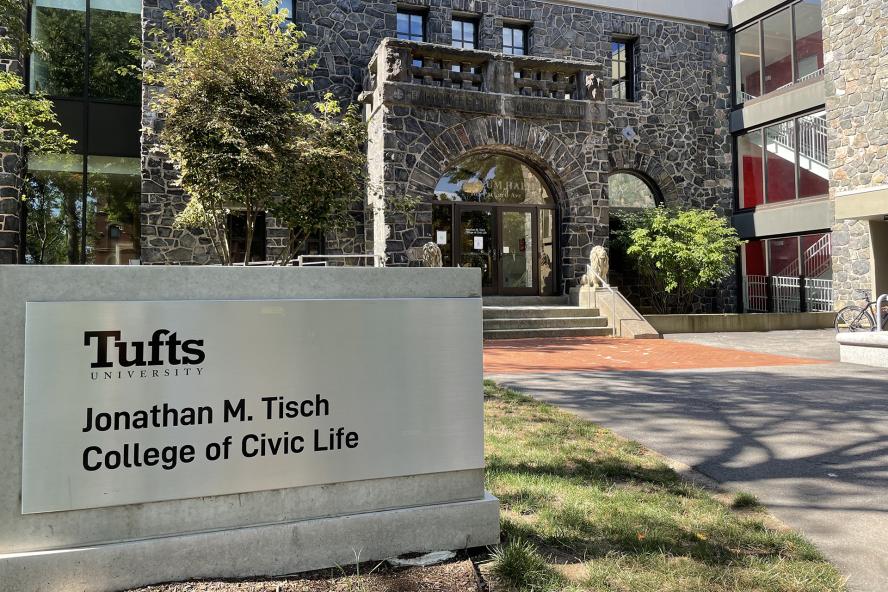Tisch College Research Centers Lay the Groundwork for Youth Voting Rights Act

Tufts University’s Jonathan M. Tisch College of Civic Life is a national leader in youth civic engagement and education, conducting some of the most influential, non-partisan research on youth political participation and power. Now that influence extends to pending legislation in the United States Congress: the Youth Voting Rights Act, introduced by Senator Elizabeth Warren (D-MA) and Representative Nikema Williams (GA-05).
Two Tisch College research centers, the Center for Information & Research on Civic Learning and Engagement (CIRCLE) and Institute for Democracy & Higher Education (IDHE) contributed vital data and research cited in the Youth Voting Rights Act (YVRA), which was introduced on July 11, 2022. The YVRA is meant to decrease persistent barriers to youth participation in elections, enforcing the 26th Amendment and expanding youth access to the polls.
“Voting is the beating heart of our democracy. Young people are the future of America, and with voting rights under attack across the country, we must do everything we can to ensure they can exercise their right to vote,” said Senator Warren in a press release accompanying the bill.
Researchers at CIRCLE and IDHE are particularly excited about provisions of the bill: making voter pre-registration for 16- and 17-year-olds available nationally; a call to gather youth voting data across age and race; grant programs aimed at providing more resources to youth-serving organizations and municipalities working to engage young voters; and programs aimed at increasing voting access for college students. Many of these provisions were based, in part, on the extensive research and reports generated by both research centers in recent years.
A centerpiece of the bill is universal pre-registration, a research-based practice that makes it easier for young people to vote as soon as they turn 18. Currently, only half of states offer pre-registration, and even fewer offer it for people aged 16. Less than one million (of about 8 million) 16- and 17-year-olds were pre-registered to vote in 2020. But a CIRCLE analysis found that, on average, U.S. counties in states with pre-registration had a 9-point higher youth voter turnout rate (ages 18-29) than those without pre-registration in 2020. For IDHE, universal preregistration will assist the work already being done on college campuses. For students matriculating during an election cycle, they are often under a near-immediate deadline to register to vote, if they have not already done so, the moment they step on campus.
“Our research shows that pre-registration is one of the most powerful tools in our policy toolbox to increase and diversify the youth electorate,” says Kei Kawashima-Ginsberg, Newhouse Director of CIRCLE. “It allows teens to start developing an identity as voters, it facilitates opportunities for registration in schools, and it expands the connections between civic education and electoral participation - all of which are key to our CIRCLE Growing Voters framework for how we can transform how we prepare young people for democracy.”
The bill calls for youth voting data to be collected and reported by age and race. According to CIRCLE researchers, there have been persistent gaps in voter turnout by race and ethnicity, owing in part to differences in access and to historical marginalization. Examining the voting rates, needs, and experiences of different groups of youth (as CIRCLE’s research does) is key to not only growing the youth electorate, but growing it equitably. IDHE’s research on student voting shows that while there have been some promising trends in terms of both registration and turnout rates among college students, equity gaps still exist. The first step in addressing these inequities is to ensure that there is solid data and an informed approach to the work, which this bill would help support.
The bill also codifies several aspects of student political participation that may be taken for granted in some states but are actively under attack in others. Specifically, the legislation’s provisions around student identification cards, voter registration, and offering polling places on campuses, all speak to higher education’s vital role in our democracy - and, in some cases, their responsibilities under federal law.
"U.S. colleges and universities can and should play a crucial role in educating for democracy. Part of that work is bringing about a year-round commitment from campus leaders to removing barriers to student voter access and actively protecting these students' rights to vote," Nancy Thomas, Director of IDHE notes. "Codifying and providing support for these essential functions of higher education advances a learning agenda that centers an equitable, aspirational vision of democracy. We are proud to leverage our research and data-backed resources to support this learning agenda whenever possible."
Additionally, the bill outlines the creation of a grant program that would provide resources to states with the specific aim at “growing voters,” a focus of CIRCLE’s most recent report and framework. This funding can be used by various institutions and localities to creatively engage the youth in their area. Some examples of how these grants could be used are outlined in CIRCLE’s Growing Voters Report and include: school districts providing professional development for educators to engage in nonpartisan teaching about elections; election offices starting or expanding youth poll worker programs; and local governments instituting youth advisory groups.
Youth engagement in elections is essential to further bolstering our democracy. The provisions outlined in the Youth Voting Rights Act as supported by both CIRCLE and IDHE are steppingstones on the path to greater representation and equality in our voting systems. Tisch College is invested in ensuring that Tufts students, and students and young people across the nation, have the education, resources, and access required to participate fully in civic life.